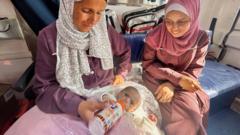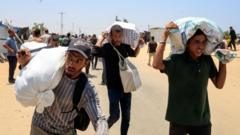UN officials warn that hundreds of thousands of refugees are at risk of starvation as aid from the US drops dramatically.
**Starvation Crisis Looms in Kenya's Refugee Camps Amid US Aid Reductions**

**Starvation Crisis Looms in Kenya's Refugee Camps Amid US Aid Reductions**
Refugee children in Kakuma face severe malnutrition as food rations plummet due to US funding cuts.
In the sprawling Kakuma refugee camp in northwestern Kenya, a troubling scene unfolds as hundreds of children are admitted to hospitals suffering from severe malnutrition. After significant cuts to US foreign aid programs had a ripple effect on food supplies, the United Nations is sounding the alarm over what they describe as a looming starvation crisis impacting hundreds of thousands of displaced people.
Kakuma is home to approximately 300,000 refugees who have fled conflicts across Africa and the Middle East. At the Amusait Hospital, emaciated children crowd the 30-bed ward, some staring vacantly as they receive vital care. Cases like that of an infant, Hellen, who appears lethargic, illustrate the gravity of the situation. A medic shares that severe malnutrition has caused her skin to become wrinkled and red.
Families like that of nine-month-old James, who is the eighth child of refugee Agnes Awila from Uganda, are in desperation. “The food is not enough; my children eat only once a day,” she lamented, underscoring the dire circumstances faced by many. The World Food Programme, which historically depended on the US for roughly 70% of its funding in Kenya, has resorted to slashing aid rations to an alarming 30% of the minimum required for health.
Felix Okech, the WFP's head of refugee operations in Kenya, highlighted the precarious situation, noting, "If we have a protracted situation where this is what we can manage, then basically we have a slowly starving population." Outside the food distribution center at Kakuma, people gather in long queues under the blazing sun, with many leaving with insufficient food supplies.
Mukuniwa Bililo Mami, a mother from the conflict-ridden Democratic Republic of Congo, recalls a time when food was more abundant. Now, she explains that the scant distribution of food—primarily rice and lentils—is hardly enough to last her family for more than a few weeks. Additionally, cuts to cash transfers, that previously helped families buy essential supplies, have left many vulnerable and struggling to nourish themselves adequately.
Traders in the camp also feel the pinch; without the capacity for refugees to purchase food, many face a grim outlook. The situation has left community members in despair, as they encounter customers pleading for food to feed their hungry children.
In homes throughout Kakuma, like that of 28-year-old Agnes Livio, families are forced to wait long hours for their first meal of the day. Her five children now eat only once daily—a crude reality that is leaving many desperate for assistance.
As children receive rushed treatment at Amusait Hospital, a stark reminder of the situation remains. Experts indicate that if the funding landscape does not improve in the coming months, refugees may face even graver challenges. The possibility of regaining adequate aid remains uncertain, as the WFP continues to appeal for support to combat this critical juncture in food security for refugees in Kenya.






















